Archived Fire Damage Blog Posts
Tips to Stay Safe during Fire Damage: SERVPRO of Buford/Suwanee/Hamilton Mill
3/29/2022 (Permalink)
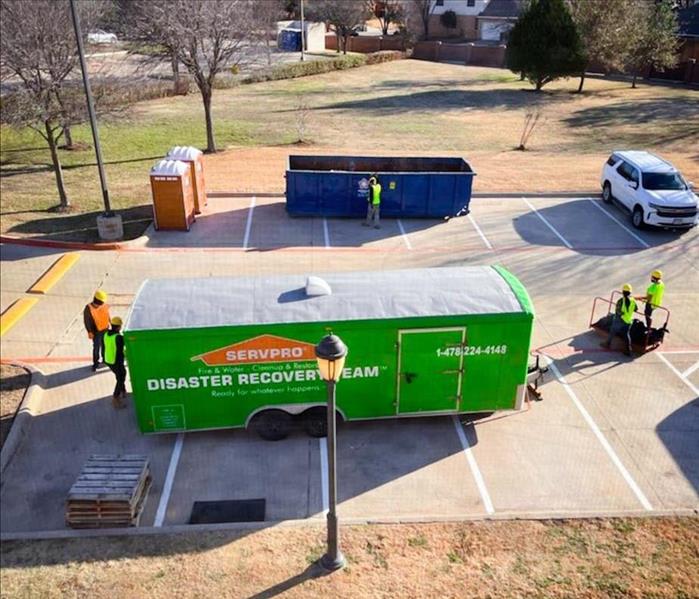 no matter how serious your property damage may be, SERVPRO of Buford/Suwanee/Hamilton Mill is your local fire damage expert. Call today!
no matter how serious your property damage may be, SERVPRO of Buford/Suwanee/Hamilton Mill is your local fire damage expert. Call today!
It's that time of year again - fire season in Sugar Hill, GA and surrounding areas. Between February and May, the weather gets hotter and drier, while the risk of house fires rises. A fire may start from a variety of sources, ranging from a faulty wire to an overloaded outlet to a kitchen mishap to a bonfire left unattended. It's critical to know how to react quickly and effectively if your home catches fire.
Here's What You Need To Know If A Fire Starts:
The first line of defense against a house fire is to know how to use the proper fire extinguisher for the situation. This simple procedure can help save lives and hundreds of thousands of dollars in property damage. If the fire spreads uncontrollably, evacuate immediately and stay away, then call 9-1-1. Leave all of your belongings where they are and save yourself and your loved ones.
If your clothing ignites, remember the old adage: Stop, Drop, and Roll.
It's critical to utilize the stairs if you live in a building with elevators in case of a fire. The elevator electrical system may be damaged by a fire, causing the shaft to operate like a chimney and rapidly fill up with deadly fumes.
Doors may be used to your advantage in a fire, potentially saving your life. If the doorknob or handle is hot, don't open it. If you can't exit through the primary route, look for another option. Do not open any doors that are warm to the touch.
Close any doors that might obstruct your exits, lay a wet towel beneath the doors, and call the fire department or 9-1-1 if flames, heat, or fire block your avenues of escape. Tell them exactly where you are so they can find you.
If you're near a window that you can't use as an escape, open it and wave a brightly colored cloth or use your phone flashlight to signal for help.
What To Do After a Fire
After a fire, it is important to contact a professional fire damage restoration company like SERVPRO of Buford/Suwanee/Hamilton Mill. We have the training, experience, and equipment to properly restore your home - "Like it never even happened."
If you try to clean up the fire damage yourself, you could end up making the situation worse both in your home and with your insurance company's process.
Trust the experts, and call today!
5 Safety Tips for Cooking on a Grill
2/21/2022 (Permalink)
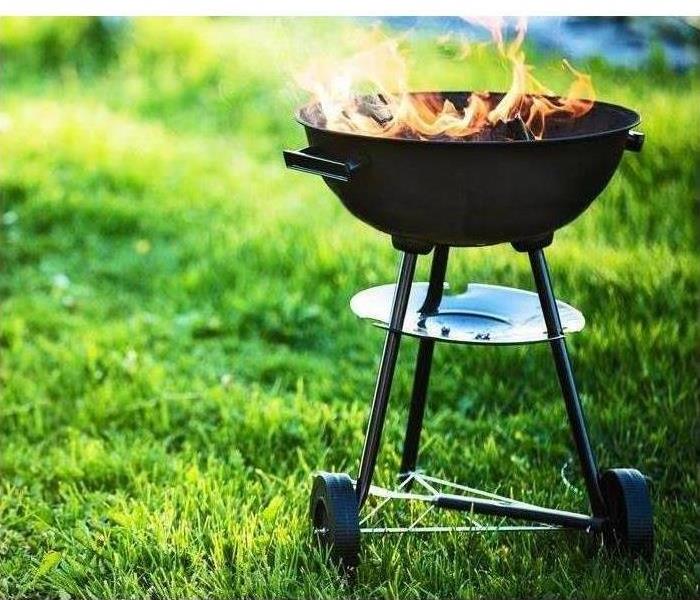 If you stay safe, grilling can be a fun and enjoyable pastime.
If you stay safe, grilling can be a fun and enjoyable pastime.
Cooking on a Grill: 5 Safety Tips
Having a family barbecue and cooking on the grill in your backyard in Rest Haven, GA can be a great way to spend your days during warmer weather. However, it can become dangerous if you’re not careful. A grill fire can happen quickly, so keep these tips in mind when you’re grilling to avoid injuries or damage to your property.
1. Keep the Grill Away From the House
While many people like to grill on a deck, this can lead to disaster if a fire occurs. It could spread to your house and cause a lot of fire and smoke damage. Fire remediation can be a time-consuming process and you could lose valuable and sentimental objects, so it is best to use your grill as far from the house as you can.
2. Only Use Fluids Made for Grills
If you use a charcoal grill, be sure to use only lighter fluid that is specifically made for this purpose. Other flammable liquids might not be safe for use around food. They can also more easily cause a grill fire. You should also never add more fluid after it has already been ignited.
3. Keep the Grill Clean
You should remember to clean your grill regularly. Built up fat and grease can cause a barbecue fire to flare up and become a safety hazard.
4. Open the Grill Before Turning On the Gas
If you have a gas grill, always open the lid of the grill before turning on the gas. If you turn the gas on while the grill is still closed, the gas will build up and can create a fireball when ignited.
5. Never Leave the Grill Unattended
When you are grilling, you should always make sure that someone is there to keep an eye on it. If a fire were to start while the grill was unattended, it could cause quite a bit of damage before you even notice.
Because cooking on a grill can be dangerous, you should always take proper precautions to avoid a grill fire. If you stay safe, grilling can be a fun and enjoyable pastime.
Renters Insurance Provides Comprehensive Fire Coverage
12/6/2021 (Permalink)
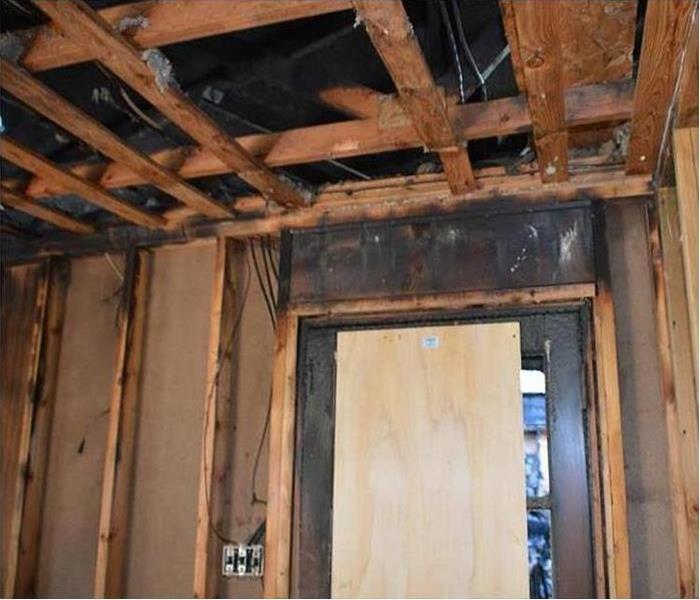 Fire damaged structure in Suwanee, GA.
Fire damaged structure in Suwanee, GA.
Renters Insurance Includes Comprehensive Fire Protection
As a renter, you may feel that you don’t need rental insurance. After all, your home isn’t full of valuables. You reason that:
- It’s not your building.
- Your personal belongings aren’t worth much.
- You don’t need another bill.
All this becomes moot when your new landlord points out that your lease requires that you have a rental insurance policy. After hearing that, you purchase one. When the coverage letter arrives, you put it away with your other important papers, unread. You should have read that letter. It’s fascinating what your rental policy covers.
Renters Insurance Protects You From Liability Claims
Even if your negligence caused the fire, your liability coverage is there to help. For example, it covers other tenants who suffer losses and injuries. Coverage also extends to structural damage.
Insurance Pays Temporary Relocation Expenses
Unless it was only a small fire, you would need to move out until the fire restoration process is complete. Your policy will cover the cost of a hotel in or around Suwanee, GA, and other temporary relocation expenses until your home is ready for occupancy.
Most Submitted Claims Include a List Damaged Personal Property
In a fire, personal property can be damaged or destroyed in several ways including:
- Fire
- Smoke
- Water
- Fire suppression chemicals
- Other damage caused while extinguishing the fire
Your renter's insurance policy covers all costs related to fire damage. Reimbursement of the replacement cost is the norm, not the exception. If a fire destroys your three-month-old television, the insurance company will replace it. You won’t receive a lesser amount and be responsible for the difference.
Put the Fire Behind You as Quickly as Possible
After the fire, you will want to minimize your inconvenience by completing the fire restoration quickly. A team of local fire damage mitigation specialists can help you get out of the hotel and back into your home quickly. Just remember that it’s renters insurance that makes this all possible.
5 Candle Safety Tips
11/10/2021 (Permalink)
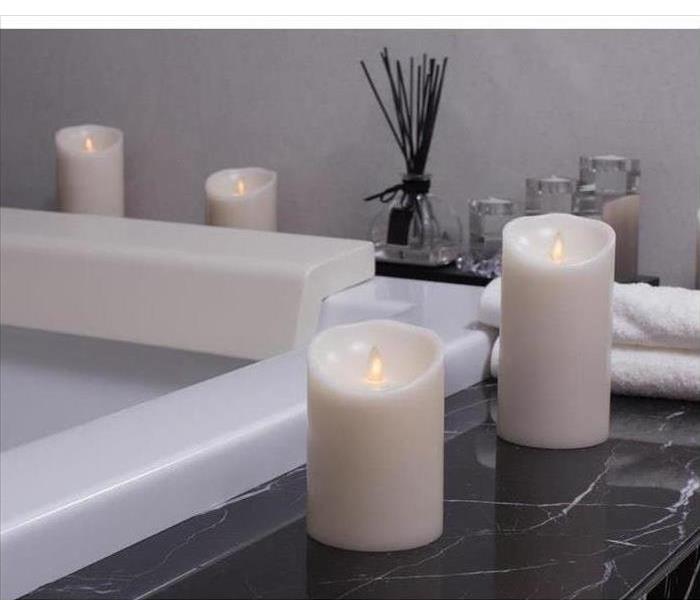 Use alternative candles to protect your home from potential fire.
Use alternative candles to protect your home from potential fire.
Tips For Avoiding a Candle Fire
Many fires in homes are caused by the misuse of candles. Any time you produce an open flame in your home, you must pay special attention to it to avoid accidents. Flammable objects can catch fire in a moment, and then you are calling for smoke cleanup. Here are five tips for avoiding a candle fire.
1. Candle Placement
Candles should only be placed in sturdy holders that are specifically designed for that purpose. Choose stable holders that are hard to tip over.
2. Candle Lighting
Be careful when lighting candles. You should avoid leaning over them as this often puts your clothing or hair dangerously close to the flame. Light candles individually with a lighter or match, not with another candle.
3. Candle Attention
Never leave an open flame unattended. When you leave the room or are ready to retire for the evening, you should make sure all the candles are blown out. Any romance inspired by the soft lighting will likely disappear if it causes a candle fire while you are asleep.
4. Candle Disposal
While it is commendable to want to avoid wasting resources, it is dangerous to burn a candle all the way to its base. This puts the flame too close to the holder and can cause it to become too hot, scorching the surface on which it is sitting or even causing it to catch fire.
5. Candle Alternatives
The easiest way to avoid candle fires is to use other lighting options. Look for flameless candles that can help you achieve the same ambiance without the open flame. Keep battery-powered light sources handy for emergencies such as power outages so that you don't have to rely on candles to see in the dark.
To protect your home in Suwanee, GA, from a candle fire, you must take several precautions. When you use candles safely or choose safer alternatives, you are protecting your home from potential fire damage.
Natural Gas Safety and Fire Prevention Tips
7/23/2021 (Permalink)
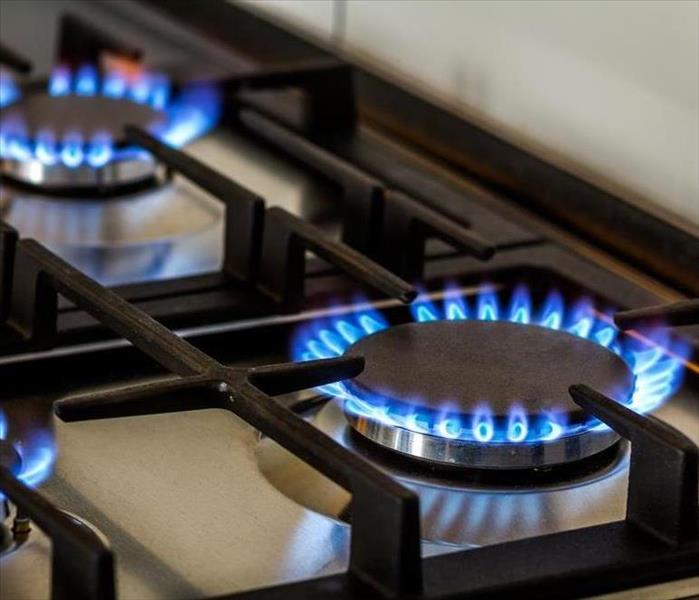 To keep homeowners safe from a gas explosion, fire recovery and restoration experts recommend proactive maintenance on every gas appliances.
To keep homeowners safe from a gas explosion, fire recovery and restoration experts recommend proactive maintenance on every gas appliances.
Safety and Fire Prevention Using Natural Gas
Natural gas is a simple carbon-hydrogen, air-like compound that has no unpleasant odor. In order to keep people safe, a rotten egg smell is added by the businesses that distribute the gas to home suppliers. The sulfuric odor is meant to alert homeowners to a dangerous situation because as the smell becomes noticeable, the presence of the highly combustible gas can pose a great threat to homes, animals, and human life. A natural type gas fire is one of the most explosive situations a property owner can experience, and one of the most devastating as well.
Safety Tips
Because of the explosive nature of natural gas, there are some expert-backed safety tips regarding steps to take the moment you notice the unpleasant odor of rotten egg-infused gas. So, if you notice the tell-tale smell, take care to do the following:
Extinguish all open flames including cigarettes and candles.
Turn off any flames powering appliances such as water heaters or gas stoves.
Refrain from flipping any electrical switches on or off.
Leave the area and contact authorities as soon as possible – but not from a phone inside your home.
Furthermore, it is important to take all pets out of the house to prevent potential harm or injury.
Prevention Tips
Natural gas is a huge part of many people’s lives in Rest Haven, GA. From ovens to barbeques, there are many ways people heat and cook with the explosive gas in daily life. To keep homeowners safe from a gas explosion, fire recovery and restoration experts recommend proactive maintenance on every gas appliances at least once a year. The same maintenance should also be done on gas lines into the house and all appliance supply gas joints. Installing a carbon monoxide detector and refusing to sleep in a room heated by gas can also prevent serious injury from a gas fire.
Security Tips
If you do happen to smell a leak, don’t attempt to locate the source of the natural gas. It is always important to remember that the smallest spark can ignite a gas fire.
4 Ways You Can Avoid Fire Hazards While Cooking
6/24/2021 (Permalink)
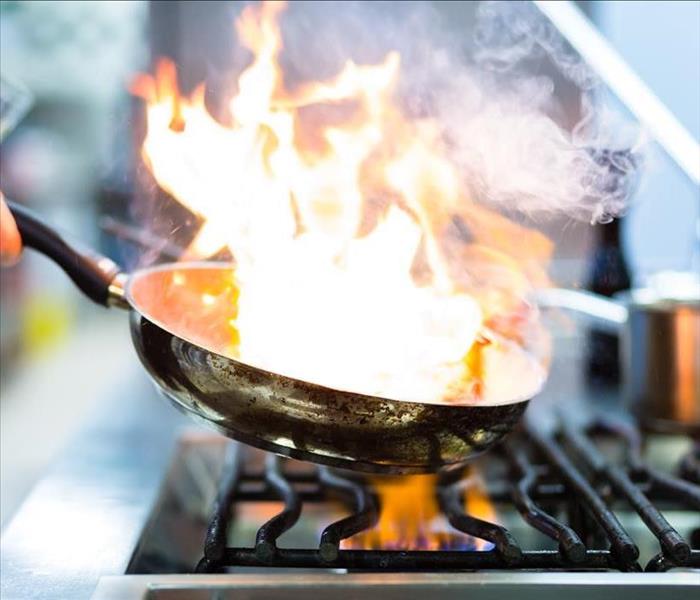 Kitchen fires can be scary and dangerous.
Kitchen fires can be scary and dangerous.
Ways To Prevent A Grease Fire
Cooking is a normal part of daily life. However, fires in the kitchen can happen when you’re not paying attention. Fire damage can cost a lot of time and money, so it’s best to avoid causing problems in the first place. Here are a few tips that can prevent an oven or grease fire from starting.
1. Keep Your Cooking Space Clear
One of the easiest ways to prevent disastrous consequences is to keep your counters and oven tidy. Flammable objects such as paper, plastic bags, wooden utensils, or towels can often clutter the kitchen and sometimes get in the way while cooking. Before you turn any heat on, be sure to clean up your cooking space.
2. Stay in the Kitchen
One of the most important fire safety tips is to stay nearby while your food is cooking. Not only will you be able to contain fires that start, but you can prevent them from ever happening by keeping an eye on the temperature of the stove and preventing food items from burning.
3. Install an Alarm
Smoke detectors can warn you and household members of a fire, which is why it’s important to have an alarm installed in or near your kitchen area. It is wise to install a few more alarms in locations such as:
- Bedrooms
- Living room
- Stairways
- Basement
Having smoke alarms in many locations, including the kitchen, within your house can protect you and your family from harm.
4. Clean the Stove
Appliances such as the oven and stove need to be cleaned regularly to decrease the risk of a fire hazard. A grease fire can occur when grease builds up over time and ignites. Grease fires can become dangerous quickly, and they should be avoided as much as possible.
Kitchen fires are scary and dangerous, so it’s important to take extra measures to prevent them. By incorporating these tips in Rest Haven, GA, you can reduce hazards and fire damage.
Is Business Interruption Insurance Worth It?
2/2/2021 (Permalink)
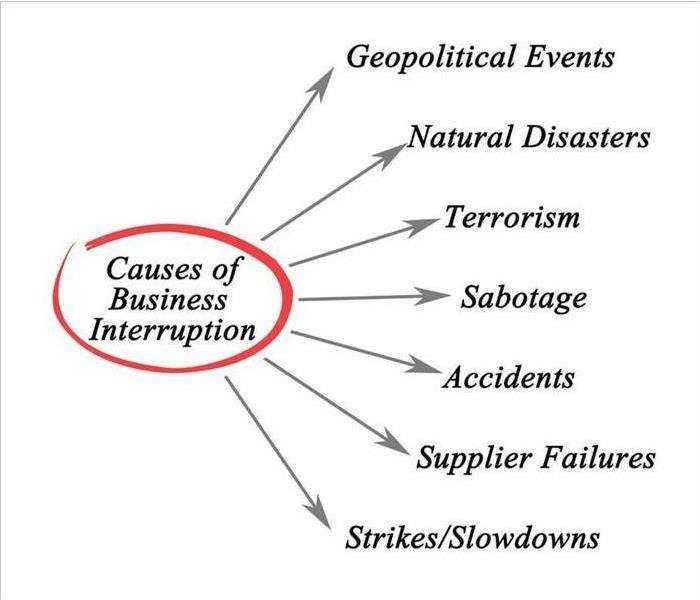 Interruption insurance eases the pain by covering employees’ wages until payroll resumes
Interruption insurance eases the pain by covering employees’ wages until payroll resumes
4 Types of Losses That Business Interruption Insurance Covers
Choosing insurance can be a confusing and time-consuming process, weighing affordability against necessity. When it comes to protecting your business, interruption insurance may be overlooked, yet it can be a business-saver in the event of a disaster. Your business could be out of service for a month or more for restoration purposes. Property insurance covers physical assets, but what doesn’t it cover? Here are four types of losses that business interruption insurance covers that property insurance doesn’t:
1. Lost Profits
If your business is unable to run properly, time out of service will mean profit loss. Typically the insurance company will assess recent profits and reimburse the expected loss amount.
2. Lost Employee Wages
Employees can’t be without work for long without wages. More than a few weeks without a paycheck could be a deal-breaker for employees living paycheck to paycheck. Interruption insurance eases the pain by covering employees’ wages until payroll resumes.
3. Temporary Operating Location
Especially in the event of a fire, the building might be so damaged that you can’t work out of that location. Fire restoration experts will probably be required to get your business up and running again as soon as possible. A temporary location could be necessary to keep your business afloat. Business interruption insurance can cover relocation and operation costs.
4. Lease and Loans
Monthly lease and loan payments will continue to come due. This insurance might cover some of those costs (e.g., building and machinery). Eviction or repossession is a real possibility if a payment is more than a couple of months late so having this kind of coverage could be critical to the survival of your business.
As a business owner in Rest Haven, GA, you need the assurance that your enterprise will survive the worst calamity. You’ll want to weigh the cost of the interruption insurance against what you can afford and what you can’t afford to lose. Creating a plan for a potential disaster can diminish worries before and after a catastrophic event. This will allow you to concentrate on keeping your company financially secure until your business can be restored.
Does Homeowner’s Insurance Cover a Fire?
12/8/2020 (Permalink)
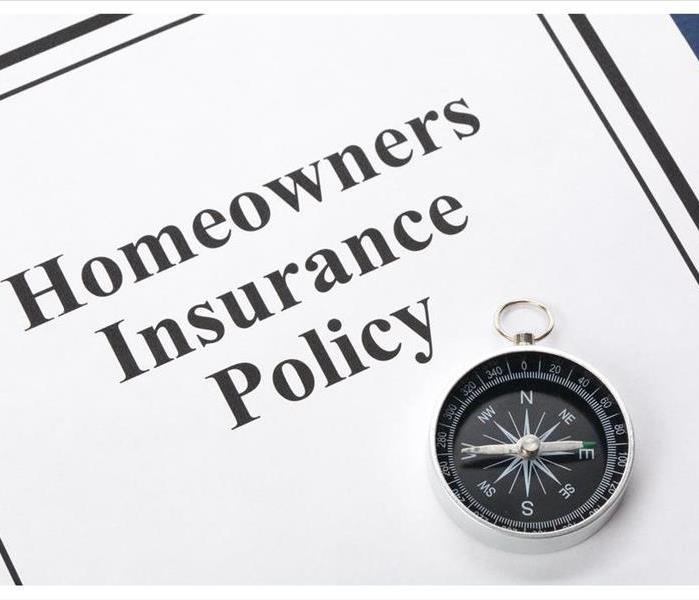 Buy homeowner's insurance to protect your home and belongins
Buy homeowner's insurance to protect your home and belongins
What Is Covered By Your Insurance Policy
You buy homeowner's insurance to protect your home and belongings. Generally, they will help pay for damage from a disaster, such as a home fire. Whether it is started by arson or a cooking disaster, a fire can consume your home and belongings. Afterward, you will probably need to hire qualified restoration professionals to repair the damage. To prepare yourself for this situation, you should know what is covered by your insurance policy.
What Is Covered?
When an accidental home fire strikes, your insurance company will generally pay for the fire damage to be repaired on your listed buildings. This can include:
- House
- Sheds
- Garages
- Barns
- Fences
- Personal belongings
How Much Coverage Do You Need?
Your coverage limit should be tailored to your home. The limit is the maximum amount you will receive after a home fire. This means you should choose a limit that will cover your home, outbuildings, and personal belongings. When purchasing coverage, you will likely see personal property and dwelling limits.
Personal property limits cover the cost of replacing personal property damaged during a fire. However, your policy may not cover the entire value of certain items. For instance, you may want to purchase additional policies for any expensive jewelry you have so you can replace them.
What Is Not Covered?
Homeowner's insurance does not cover all types of fire. For instance, if you intentionally set fire to an empty house on your property, you will not be reimbursed. Additionally, any fires caused by wars are not covered. For more details, you should read your policy thoroughly to see what is not covered.
Knowing more about your homeowner's insurance policy will help you be prepared in the event of a fire. While an intentionally set vacant home fire is not covered, fires that started on accident in your home in Buford, GA, will generally be covered.
How Water Damage and Fire Damage Can Be Related
11/11/2020 (Permalink)
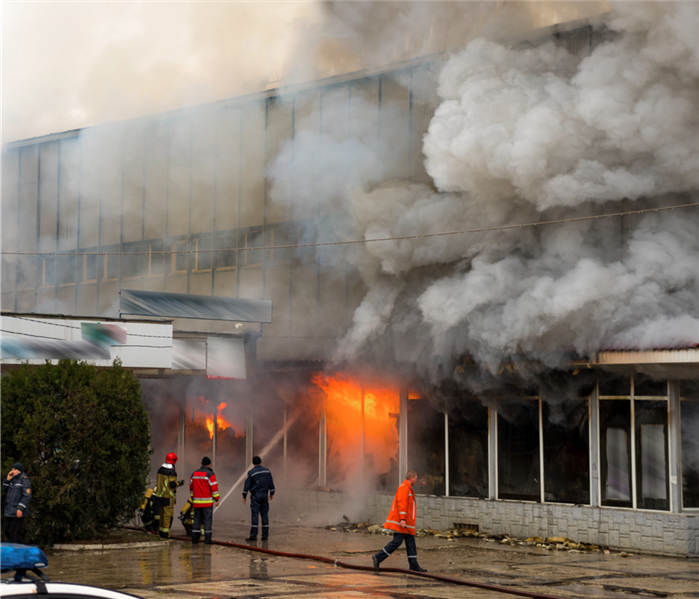 Commercial fire and water damage in Rest Haven, GA
Commercial fire and water damage in Rest Haven, GA
Here Are A Few Ways Water Damage Can Occur After A Fire
Believe it or not having to conduct a water cleanup at your Rest Haven, GA, place of business is something that many local fire restoration professionals anticipate any time they're called to a job. Much like needing to perform a smoke cleanup, a restoration evolving water damage is a normal part of a fire cleanup.
1. Fire Suppression
The suppression efforts used to put out the fire in the first place may also lead to water damage. For example, the use of a fire hose can cause flooding as a fire hose can pump out up to 500 gallons per minute. The fire may be put out, but water can be left behind. Similarly, suppressant released by an overhead sprinkler system may contain less water, but if allowed to sit it too can lead to water damage
2. Weather
After a fire, wet weather such as rain, hail or snow can cause problems which result in the need for a water cleanup. This typically occurs after the fire has weakened the exterior structure leaving holes that the weather can get through. The damp space left after a storm can turn into water damage if left unattended. This is why you may see your restoration service board or tarp over the building until repairs can be made.
3. Plumbing
Your plumbing can be affected by a fire as well. The heat can put stress on joints or thinner areas of metal, which can then weaken the pipes allowing them to possibly burst after a fire. This can result in flooding in these areas, and possible water damage. Fortunately, your local restoration service should be able to handle any clean up the repairs of this type of water damage.
Needing a water cleanup after a fire at your place of business is actually fairly expected. This is because things like a fire suppression efforts, wet weather, and problems with plumbing can all contribute to possible flooding. Fortunately, many local fire restoration professionals expect possible water damage and will know how to best restore the property.
3 Important Things To Know About Fire and Insurance
9/18/2020 (Permalink)
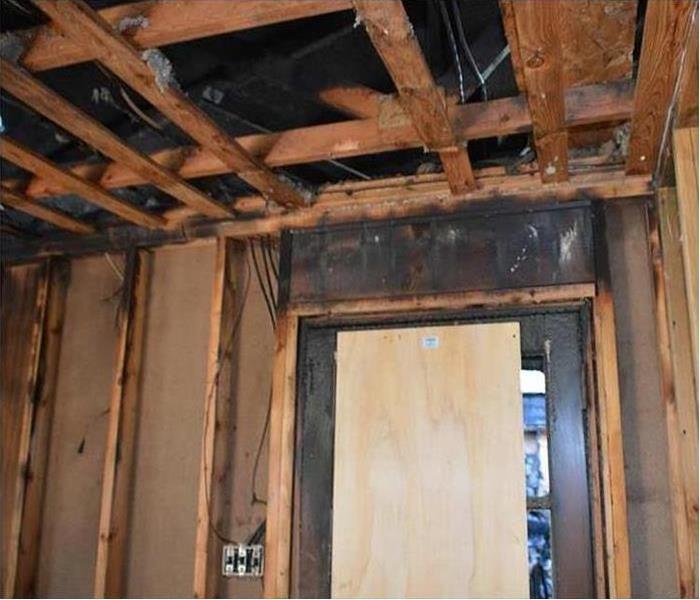 Fire damaged a structure in Suwanee, GA
Fire damaged a structure in Suwanee, GA
What Is and Isn't Cover In Your Insurance Policy?
A home fire in Suwanee, GA, in addition to its emotional and psychological costs, can be financially draining. Any repairs beyond a superficial burn can come with a hefty price tag. While homeowner's insurance should cover most fire damage claims, consumers need to have a good idea of what is and is not covered in their policy, and how to further protect themselves.
1. What Is Covered
Simply put, accidents. Whether it is a kitchen fire or an electrical wire falling on your house, most standard insurance policies will cover damage from fire and smoke to some degree.
2. What Is Not Covered
Arson is not covered. Insurance companies can rightfully deny any claim on an event that arose from a violation of the law. In fact, sometimes companies speculate that a fire was set on purpose in order to exclude a claim. Homeowners should work closely with fire officials and investigators to provide conclusive evidence that criminal intent was not the cause of a fire.
A vacant home fire also will not be covered. Generally, a residence that is unoccupied for more than 30 days is considered vacant. This is important to know for new homeowners, who often spend time on improvements and repairs before moving in. An empty home fire will not be covered if the insurance company can show that a home was vacant when it burned.
3. Fire Insurance for Extra Coverage
Fire claims are complicated. They often require working with a fire damage restoration company to assess the extent of the damage, and even then, they still may be refused or insufficiently reimbursed. Depending on your personal circumstances, it might be worth purchasing supplemental fire insurance to help cover what a primary policy does not.
A home fire can be a source of great worry, but it does not have to be. Understanding what types of fire are and are not covered by insurance is a good way to prepare. With the right coverage and information, most homeowners can survive and even restore their homes to pre-fire condition.
4 Things To Do After a Fire
7/9/2020 (Permalink)
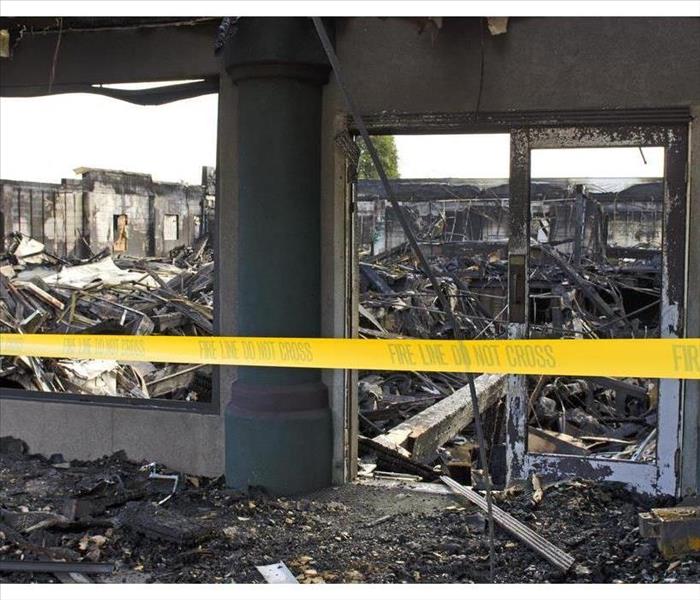 Secure the premises of your building after a fire
Secure the premises of your building after a fire
4 Things To Do After a Fire
When a company in Suwanee, GA, has suffered from fire damage, owners must determine how to best seek financial and physical aid. After all, the ashen walls and charred holes are not the representation of hard work and dreams, and surely commercial owners desire to see their place reopen. Fire restoration and insurance can be part of the solution, providing expertise and guidance on how to work. As you begin the collaborative process, proprietors should remember the following four things.
1. Contact Your Agent
The first step is to activate your fire insurance coverage. You'll want to call the office line, opening a claim. Allow the insurer to guide you through the process. During this time, ask them about your deductible, the limits, and expected procedures. Policies vary, and you don't want to forget a step. If possible, access your documentation online, and review it for full understanding.
2. Secure the Premises
Often flames can open holes within the structure, creating a security problem. To avoid any complications, you'll want to preserve the building as best as possible, avoiding trespassers, vandals, and environmental damage. Fire restoration companies can assess the area, help you secure the property, and board up exposed sections.
3. Have Inspections
Don't try to fix anything. You may think it's helpful to wash off walls or clean up carpets, but that could be problematic. Instead, have experts evaluate the need for smoke cleaning and water remediation. They may see issues that aren't immediately visible. Plus, their teams have special equipment to sanitize and repair.
4. Photograph Damage
Evidence is extremely valuable. You want to prove that your property suffered. Before you have anything replaced or changed, snap photos. Get up close, exposing the destruction. Save them to your computer in a file, labeling them with a date.
After a blaze, you'll have to force yourself to step back and go slow. Open a claim, patch up the building, and leave everything else alone. Fire restoration services can handle investigations and reconstruction.
 no matter how serious your property damage may be, SERVPRO of Buford/Suwanee/Hamilton Mill is your local fire damage expert. Call today!
no matter how serious your property damage may be, SERVPRO of Buford/Suwanee/Hamilton Mill is your local fire damage expert. Call today!






 24/7 Emergency Service
24/7 Emergency Service









